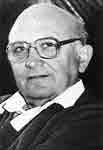Aharon Appelfeld

(1932 - )
Aharon Appelfeld is an Israeli novelist and Holocaust survivor.
Appelfeld (born February 16, 1932) was born in Czernowitz, Rumania,
and deported to a concentration camp at the age of eight. He escaped and spent three years hiding in the
Ukraine before joining the Russian army. A post-war refugee, he made
his way to Italy and immigrated to
Eretz Israel in 1946. He currently resides in Jerusalem.
Appelfeld, a Hebrew University graduate, is now a
professor of Hebrew Literature at Ben Gurion University of the Negev.
He began publishing poetry in 1959. He writes novels, short stories
and essays and his work has been translated to a number of languages.
Appelfeld's work is recognized
worldwide as among the most profound literary
explorations of the Holocaust,
and has met with international critical and
popular acclaim. Appelfeld has also received the Israel Prize.
Books Published in Hebrew
Smoke (stories), Achshav, 1962 [Ashan]
In the Fertile Valley (stories), Schocken, 1963 [Ba-Gai
Ha-Poreh]
Frost on the Land (stories), Massada, 1965 [Kfor Al Ha-Aretz]
On the Ground Floor (stories), Daga, 1968 [Be-Komat Ha-Karka]
Pillars of the River (stories), Hakibbutz Hameuchad, 1971
[Adanei Ha-Nahar]
The Skin and the Gown (novel), Am Oved, 1971 [Ha-Or
Ve-Ha-Kutonet]
As an Apple of His Eye (novella), Hakibbutz Hameuchad, 1973 [Ke-Ishon
Ha-Ayin]
A Hundred Witnesses (stories selection), Hakibbutz Hameuchad,
1975 [Ke-Meah Edim]
Years and Hours (novellas), Hakibbutz Hameuchad, 1975 [Shanim
Ve-Shaot]
The Age of Wonders (novel), Hakibbutz Hameuchad, 1978 [Tor Ha-Plaot]
First Person Essays (essays), WZO, 1979 [Masot Be-Guf Rishon]
Badenheim 1939 (novel), Hakibbutz Hameuchad, 1979 [Badenheim
Ir Nofesh]
Searing Light (novel), Hakibbutz Hameuchad, 1980 [Makot Ha-Or]
The Shirt and the Stripes (novella), Hakibbutz Hameuchad, 1983
[Ha-Kutonet Ve-Ha-Pasim]
Tzili: The Story of a Life (novel), Hakibbutz Hameuchad, 1983
[Tzili:Sipur Haim]
At One and the Same Time (novel), Hakibbutz Hameuchad, 1985
[Be-Et U-Be-Ona Ahat]
Tongue of Fire, Keter, 1988 [Ritzpat Esh]
Katerina (novel), Keter, 1989 [Katerina]
The Railway (novel), Keter, 1991 [Mesilot Ha-Shahar]
Laish, Keter, 1994 [Laish]
Lost, Keter, 1995 [Timion]
Until the Dawn's Light, Keter, 1995 [Ad She-Ya'ale Amud Ha-Shahar]
The Ice Mine, Keter, 1997 [Michreh Ha-Kerah]
All That I Have Loved, Keter, 1999 [Col Asher Ahavti]
The Story of a Life, Keter, 1999 [Sipur Haim]
Sources: Copyright The
Institute for the Translation of Hebrew Literature. Reprinted by
kind permission of The
Institute for the Translation of Hebrew Literature, Ramat Gan
Israel. The Institute web site contains biographies of 300 Israeli
authors. Photograph by Dina Guna. |